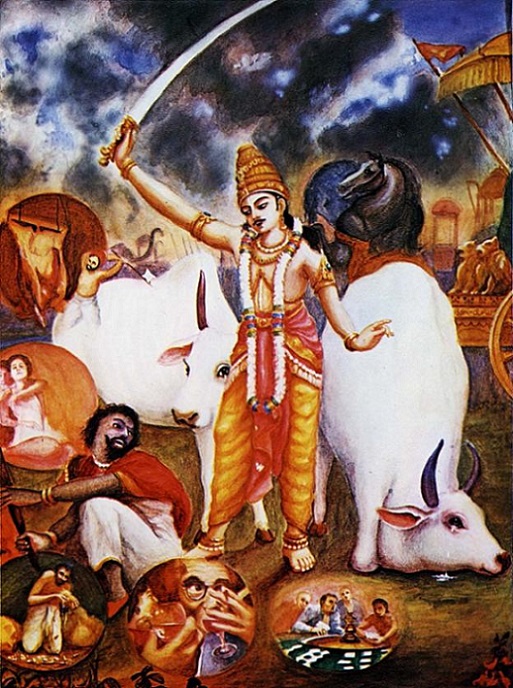(Maharaja Pariksit chastising Kali as described in Srimad-Bhagavatam First Canto Chapter 17)
"Rāja-dharma is a great science, unlike modern diplomacy for political supremacy. The kings were trained systematically to become munificent and not merely be tax collectors. They were trained to perform different sacrifices only for the prosperity of the subjects. To lead the prajās to the attainment of salvation was a great duty of the king. The father, the spiritual master and the king are not to become irresponsible in the matter of leading their subjects to the path of ultimate liberation from birth, death, diseases and old age. When these primary duties are properly discharged, there is no need of government of the people, by the people. In modern days the people in general occupy the administration by the strength of manipulated votes, but they are never trained in the primary duties of the king, and that is also not possible for everyone. Under the circumstances the untrained administrators play havoc to make the subjects happy in all respects. On the other hand, these untrained administrators gradually become rogues and thieves and increase the taxation to finance a top-heavy administration that is useless for all purposes. Actually the qualified brāhmaṇas are meant to give direction to the kings for proper administration in terms of the scriptures like the Manu-saṁhitā and Dharma-śāstras of Parāśara. A typical king is the ideal of the people in general, and if the king is pious, religious, chivalrous and munificent, the citizens generally follow him. Such a king is not a lazy sensuous person living at the cost of the subjects, but alert always to kill thieves and dacoits. The pious kings were not merciful to dacoits and thieves in the name of nonsensical ahiṁsā (nonviolence). The thieves and dacoits were punished in an exemplary way so that in the future no one would dare commit such nuisances in an organized form. Such thieves and dacoits were never meant for administration as they are now.
The taxation law was simple. There was no force, no encroachment. The king had a right to take one fourth of the production made by the subject. The king had a right to claim a fourth of one's allotted wealth. One would never grudge parting with it because due to the pious king and religious harmony there was enough natural wealth, namely grains, fruits, flowers, silk, cotton, milk, jewels, minerals, etc., and therefore no one was materially unhappy. The citizens were rich in agriculture and animal husbandry, and therefore they had enough grains, fruits and milk without any artificial needs of soaps and toilets, cinemas and bars.
The king had to see that the reserved energy of humanity was properly utilized. Human energy is meant not exactly for fulfilling animal propensities, but for self-realization. The whole government was specifically designed to fulfill this particular purpose. As such, the king had to select properly the cabinet ministers, but not on the strength of voting background. The ministers, the military commanders and even the ordinary soldiers were all selected by personal qualification, and the king had to supervise them properly before they were appointed to their respective posts. The king was especially vigilant to see that the tapasvīs, or persons who sacrificed everything for disseminating spiritual knowledge, were never disregarded. The king knew well that the Supreme Personality of Godhead never tolerates any insult to His unalloyed devotees. Such tapasvīs were trusted leaders even of the rogues and thieves, who would never disobey the orders of tapasvīs. The king would give special protection to illiterates, the helpless and widows of the state. Defense measures were arranged previous to any attack by the enemies. The taxing process was easy, and it was not meant for squandering, but was for strengthening the reserve fund. The soldiers were recruited from all parts of the world, and they were trained for special duties."
(Śrīmad-Bhāgavatam 1.9.27, Purport)
.
